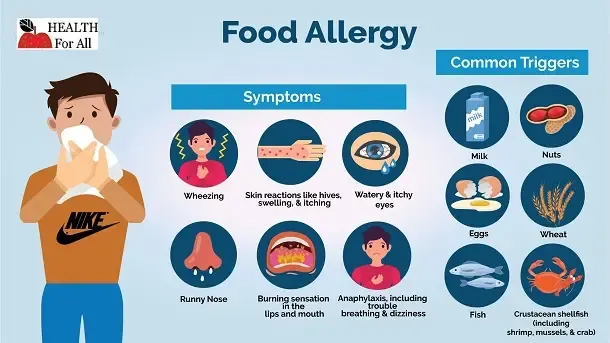Food allergies can be a serious health concern for many individuals, affecting their daily life and wellbeing. This condition occurs when the immune system mistakenly identifies a food protein as harmful and reacts to it, leading to a range of symptoms.
Symptoms of Food Allergies
The symptoms of food allergies can vary from person to
person, but common signs include:
· Hives or skin rash.
· Swelling of the face, lips,
or tongue.
· Nausea and vomiting.
· Stomach cramps or diarrhea.
· Breathing difficulties,
such as wheezing or coughing.
· Anaphylaxis, a severe and
potentially life-threatening reaction that can cause difficulty breathing, low
blood pressure, and loss of consciousness.
Causes of Food Allergies
The exact
cause of food allergies is not well understood, but genetics, environment, and
individual factors such as a weak immune system can play a role. Some common
allergens include:
1. Peanuts.
2. Tree nuts (such as almonds,
walnuts, and pecans).
3. Fish and shellfish.
4. Milk.
5. Eggs.
6. Soy.
7. Wheat.
Diagnosis of Food Allergies
Diagnosing a
food allergy involves a thorough evaluation of the individual's medical history
and symptoms, as well as a physical examination. Additional tests, such as skin
prick tests or blood tests, may also be performed to confirm the diagnosis.
Treatment of Food Allergies
The best way to treat food allergies is to avoid the foods
that trigger the reaction. This may involve reading food labels, avoiding
certain foods or ingredients, and carrying emergency medications such as an
EpiPen. In some cases, allergen immunotherapy, also known as allergy shots, may
also be recommended by a healthcare professional.
Managing Food Allergies in Daily Life
Living with food allergies can be challenging, but there are
steps individuals can take to manage their symptoms and reduce the risk of
reaction. This includes:
· Educating themselves about
their specific allergens and how to avoid them.
· Carrying emergency
medications with them at all times.
· Making sure others, such as
family, friends, and coworkers, are aware of their allergies.
· Planning ahead for meals
and snacks, both at home and when eating out.
· Being prepared for
unexpected reactions and having a plan in place.
Conclusion
Food allergies are a serious health concern for many
individuals, but with proper management and treatment, it is possible to live a
full and active life. It is important to work closely with a healthcare
professional to understand your specific allergens, symptoms, and treatment
plan.
In this article, we have provided a comprehensive overview of food allergies, including their symptoms, causes, diagnosis, treatment, and management in daily life. By understanding food allergies and taking steps to manage them, individuals can reduce the risk of reaction and live a full and active life.


